- Home
- Anna McPartlin
The Space Between Us Page 2
The Space Between Us Read online
Page 2
‘How are you, Mum?’
‘I’m fine,’ she’d say, with a big smile.
‘You don’t look fine.’
‘No.’
‘You look weird.’
‘Don’t be scared.’
‘I’m not scared, I’m sad.’
Eve’s dad often tried to explain to her that saying everything that entered her head wasn’t the best idea in the world, especially when it made her mother cry. She never had mastered the art of subtlety, she mused now.
She sat on the old wooden swing-set, which she and Lily had sat on nearly every dry day until they were twelve and too old for swings. After thirty years it should have been falling apart but her father had looked after it, and it was as much a part of the landscape as the big old trees. She started to swing a little, remembering their squeals when they had gone higher and higher until their feet were touching the sky.
‘The one who swings highest gets a wish!’ Eve would call.
Lily had freaked out every time: there were so many things she wanted that it was hard to make just one wish. ‘I can’t think!’ she would squeal.
When they couldn’t swing any higher, Lily would call at the top of her voice: ‘I love you, Eve Hayes!’
‘I love you, Lily Brennan!’ Eve would scream back, and they’d giggle and kick their legs wildly.
It had been a long time since Eve had swung or indeed done anything with abandon, so she sat and stared at the ground in front of her, at the patch of grass where she’d lain on her back, with Lily at her side, battling with the sun to look up at her mother’s window. They were doing that on the day she died, lying on the grass, talking about this and that. Suddenly there had been a commotion, adults coming and going, Eve’s aunt crying, her uncle talking on the phone. Eve’s father called Clooney – and then something happened: people stopped moving around the house and someone unseen in Eve’s mother’s room closed the curtains. Lily held Eve’s hand and even though they were only six they knew that she was gone.
Eve shielded her eyes from the sun and looked up at the window. It was the only room she hadn’t visited one last time. The pain was still too raw because her dad had died in it only nine months before.
He had died on an October morning after a short illness. He was sixty-two, and up to the day he was diagnosed with cancer he had been his usual happy, healthy, busy self. He was still working as an investment banker, still mad about boats and golf, and dating Jean, a woman in her mid-fifties. It was early days but they had a lot in common and he really liked her. He still travelled, and visited Eve in New York at least three times a year. On his last visit he had brought Jean, and they’d been in love. His back had been bothering him for a while, and he had been diagnosed with Type 2 diabetes a few years before. Initially he had managed to control the disease but recently his blood sugar had been all over the place. Finally, at Jean’s insistence, he went to his GP. Two weeks later, on 16 August, he was diagnosed with terminal pancreatic cancer. It was Jean who phoned Eve in New York.
‘Hello, Eve?’
‘Yes, hello?’
‘It’s Jean McCormack … your father’s friend.’
‘Oh, Jean! Hello, how are you?’
‘I’m well. Thank you. Thank you for asking.’ She sounded weird and it didn’t take a genius to work out she wasn’t making a social call.
‘What’s wrong, Jean?’
‘It’s your dad, dear.’ She sounded like she was trying not to cry.
‘What about him?’ Eve’s heart-rate increased, her temperature rose and the blood that had previously been in her head rushed to her toes. She held on to her chair. Get to the point, Jean, for Christ’s sake.
‘He has cancer.’
‘Oh, no.’
‘In his pancreas.’
‘Oh, no.’
‘You need to come home, dear.’
‘What about Clooney?’
‘You need to get him to come home too.’ She broke down then and cried.
Eve listened to herself comfort Jean. It was as though she was hearing strangers converse through a wall. ‘All right, Jean, it’ll be all right. I’ll call Clooney and we’ll come home and take care of him. He’ll be fine because I have money and I can pay whatever it costs, so you just relax because I’ll sort it. OK?’
‘OK, dear,’ she said. ‘OK.’ But she had known that no amount of money could save Eve’s father. She was doing the only thing that could be done: surrounding him with the people he loved and who loved him.
His health declined incredibly quickly, so the last two months of his life had been very special. Eve and Clooney hadn’t lived in their childhood home since that summer of 1990. Their father didn’t want to be in hospital or a hospice so it made sense that they stay there with him during the short time he had left. Although Eve’s money couldn’t save him it could pay for the round-the-clock care he required.
Clooney arrived home two days after Eve. Despite his tan he looked grey and new lines were forming around his eyes. He got drunk that night and cried like a baby. Eve made lists of things that needed doing and got busy fitting the room in which her mother had died with all the conveniences necessary to ensure that her father was comfortable. Eve’s father was usually cheerful, but every now and then when he thought he was alone he’d scream and sob. Eve had had to hold her brother back from his door. ‘He needs this,’ she’d said.
‘He needs us,’ he’d replied.
‘When was the last time you were grateful for an audience while you cried?’ she asked.
Their father loved having them with him, especially when he wasn’t in pain. Jean was there from beginning to end but never tried to take over. Eve and Clooney thought it was odd that she prayed silently, her fingers moving up and down her rosary beads, while sitting at their father’s bedside.
‘You know my dad’s agnostic?’ Eve said to her one day.
‘Yes, dear, I do.’
‘And yet you pray.’
‘I know. Selfish, isn’t it?’
‘I’ve lost you.’
‘Well, I’m praying for me.’
‘Oh.’
‘And you? Are you an agnostic too?’
‘Until the Virgin Mary, a jolly Buddha, Allah or Brahman come to sit on the end of my bed and tell me any different,’ Eve said.
‘It’ll be hard to let him go,’ Jean said. ‘I pray for him because it makes me feel better, and I pray for me that when he’s gone I’ll have the strength to go on.’
‘You will,’ Eve said, with the confidence that came from experience, even though the thought of losing her father made her heart ache.
‘What about you?’ Jean asked.
‘People live and then they die,’ Eve said.
When they were alone Jean and Eve’s dad flirted and laughed. She brought light into his darkened room and he wasn’t the only Hayes grateful to her.
Eve and Clooney spent days in their father’s room. He loved crosswords and watching re-runs of Who Wants To Be A Millionaire? Clooney would answer the questions, as though he knew what he was talking about, but more often than not he’d get the answer wrong, making the others laugh. On one occasion Chris Tarrant asked, ‘Which legendary German scholar sold his soul to the devil?’ He gave four names.
Eve looked at her dad and shrugged. He did the same.
‘Tannhäuser,’ Clooney said confidently.
It went to fifty:fifty. Faust and Tannhäuser were the two names left. Clooney looked at them and nodded smugly. The contestant picked Faust.
‘Oops, you’ve just blown it.’
Chris Tarrant paused for what seemed an eternity before he smiled and announced that the contestant had just won £16,000.
Everyone celebrated except Clooney, who pretended to be put out by his dad’s laughter.
‘Faust. Damn it, Faust, of course.’
‘ “Of course”, my rectum, you didn’t have a clue!’ Eve said.
‘Fair enough,’ he admitted, ‘but if that was p
oker I would have won the hand.’
‘Sap!’ Eve said.
‘Yeah, well, at least I’m not a Big Foot!’ Clooney said, and laughed. Because of Eve’s height she had been christened Big Foot by a boy called Eoin Shaw in her first class at primary school and it had caught on to the extent that she didn’t rid herself of it until she moved into secondary school.
‘Danny!’ Eve appealed.
Her dad laughed and repeated, ‘Big Foot,’ under his breath. Then he recited the song the kids in Eve’s class, all but Lily, used to sing. ‘ “Big Foot Hayes doesn’t do Sundays. We go to Mass, she eats grass. Big Foot Hayes …” What was the end of it?’
‘Danny!’ Eve said again, but this time she smiled reluctantly.
Clooney thought about it for a second before raising his hand: ‘ “Big Foot Hayes blocks out sun rays.” ’
Eve’s dad giggled. ‘No future poet laureates in that bunch.’
Some afternoons they would play Monopoly together. Usually Eve won. Clooney suggested this was due to her cold, detached, industrialist Ming the Merciless personality.
‘Ah, come on, Evey, don’t take Shrewsbury Road! You always get it!’ her dad said, when it looked like she was going to win again.
‘Take comfort that it isn’t worth what it used to be, Danny.’
‘Just give it to him, Ming.’
‘Can’t do it, Clooney.’
‘I’d be happy to part with Shannon Airport, Dad?’ he offered.
His dad laughed. ‘Of course you would, son.’
When he was still able for conversation they talked about everything and anything, except that he was dying. Jean took care of his will, discussed his funeral with him, and made notes of what he wanted. He had no truck with religion and didn’t believe in an afterlife. He didn’t look forward to kicking it up on a cloud in Heaven or fear burning in an eternal Hell. He wasn’t expecting to see Eve’s mum. Even as he grew worse and his pain became more difficult to manage, they continued to pretend that Clooney and Eve were staying for an extended visit and that all was well.
When he began to slip away from them, they finally let go of the pretence. As he battled for his last breath, Eve held his hand and whispered, ‘It’s OK to let go, Danny.’ He squeezed her hand, closed his eyes and was gone.
Jean sat by the door with her head bowed, twisting her well-worn rosary beads. Clooney stood by the window facing out. Eve made notes of what she had to attend to.
Their father had wanted to keep the funeral simple, with a few words from Clooney and Eve, but if Eve didn’t want to talk that was all right, because he knew what she was like. He wanted his old friend Lenny to play the guitar and sing a few Bob Dylan songs. Afterwards he wanted them to take his ashes out to sea on his beloved sail-boat and dump him ceremoniously in the waves.
‘Is that legal?’ Clooney had asked Jean.
‘Who cares?’ Eve said.
So that was exactly what they did. Eve had packed a picnic, including a bottle of expensive wine. She, Jean and Clooney stood on the deck, each lost in their memories. They made sure they knew which way the wind was blowing because he had been adamant that they shouldn’t risk wearing or eating him. ‘Wind direction is the key, Jean,’ he had warned.
‘Got it.’
‘It’s the key,’ he repeated, before licking his finger and raising it into the air.
‘Understood.’
‘And don’t throw the urn in.’
‘Righto.’
‘That’s littering.’
‘Indeed it is.’
‘But don’t keep the urn either.’
‘Well, what would you like me to do with it?’
‘Recycle it.’
‘Okey-dokey.’
‘I wish I had more time to love you, Jean,’ he said, and smiled. ‘I’m so very sorry about that.’
‘Me too,’ she said, allowing a tear to fall as she went on ticking off his list of requests.
When they had assessed the wind direction, Eve handed Clooney the urn and he tossed the ashes overboard. Eve poured three glasses of wine and they toasted him. Jean cried the whole way back, quietly and into a large hankie – she didn’t want to make too much fuss. Clooney was silent and barely touched his drink. Eve had finished what was left in the bottle by the time they hit the harbour.
In the eleven months since her father’s passing a lot had changed. It was time to leave the house and her childhood behind. She was looking forward to a new chapter in her life, a slower-paced one. It was time for Eve to stop and smell the roses.
She closed the dark-blue front door and walked down the short, tree-lined avenue. At the end, she turned to take one last look at the large white house covered with a pink-flowering creeper, and the big oak tree in the front garden. Goodbye, old house … goodbye, childhood … goodbye, Mum … goodbye, Danny. You were amazing, we were lucky to have you both. I miss you. I love you. If I never see you again, thank you. She didn’t dally or shed a tear: her mother had taught her to keep her feelings to herself and that a lady always knows the right time to leave. She nodded to the guys in the van as they finished their lunch, then crossed the road, got into her car and drove away from the street where she’d grown up for what she believed to be the final time.
That morning Eve had spoken to Clooney briefly on the phone. He was in some hellhole in Afghanistan, feeding orphans, and he didn’t much care about the house sale.
‘I need your bank details.’
‘For what?’
‘For the money from the sale of the house.’
‘Just give my share to a cancer charity.’
‘Please don’t make it difficult.’
‘I’m making it easy.’
‘No. You’re making it difficult. I’m not going to give away your money.’
‘Please?’
‘I’ll set up an account in your name.’
‘Does that mean I have to deal with tax?’
‘You don’t give away money because you don’t want to deal with tax.’
‘You don’t. I do.’ He changed the subject. ‘You sound tired.’
‘Of course I’m tired. I’m the one doing everything while you swan around Afghanistan.’
‘People don’t swan around war zones.’
‘No. I suppose they don’t,’ she conceded.
‘You must be happy to be home again.’
‘Yeah,’ she agreed, a little half-heartedly. ‘It’s great.’
‘Maybe I’ll come and visit you soon,’ he said.
‘I won’t hold my breath,’ she said. ‘A person has to be dying to get you home.’ He didn’t argue. Instead he ended the conversation by telling her to do what she wanted with the money. ‘I don’t need it, Eve, and I don’t want it.’
Clooney had always been strange about money. Even as a kid, he had never wanted material things. He’d lived on his meagre expenses, banking his pay, for years. He had the life of a nomad without dependants. He fed the poor in the worst conditions known to man and didn’t need a suit or a car to do that. Eve’s brother, she thought, was the best person she knew at dealing with a crisis but the minute that crisis had passed he moved on because he wasn’t needed.
Clooney had left home when he was twenty. In September 1990 he was due to start his third year in college. He was studying engineering and had secured himself a spot on college radio. He did a show with a girl called Vera Kilpatrick. They hosted an evening programme from Monday to Friday.
Clooney had never liked his name. Even though his parents had agreed to call him Matthew, his mum had changed her mind as soon as she saw him with one eye open resting in her arms. ‘He’s not a Matthew. He’s a Clooney,’ she’d said.
His father wasn’t so sure he liked the idea but she was determined. ‘It’s Gaelic for “rogue”. And this one is most definitely a rogue.’
Most people had never heard the name before and he was often asked to repeat and spell it – until 1994 when George Clooney played Dr Doug Ross on ER.
Suddenly the whole Western world knew it, and on the rare Christmas when he was home the endless ‘witty’ comments made him miserable.
‘Clooney? You fancy yourself.’
‘Clooney, I need CPR. Stat.’
‘Clooney? You’re cute but not that cute.’
‘Here, Clooney, you were a shit Batman.’
His dad joked that the reason he chose to live and work in third-world countries had nothing to do with altruism and everything to do with escaping the curse of the actor George Clooney.
In the late eighties and early nineties, a lot of DJs gave themselves stupid names and Clooney was no exception. Clooney Hayes became Cloudy Dayz and his sidekick Vera Kilpatrick was known as V Kill P. She’d play Kylie and Jason’s ‘Especially For You’, he’d play Simple Minds’ ‘Belfast Child’. She’d play the Bangles’ ‘Eternal Flame’ and he’d play Guns N’ Roses’ ‘Paradise City’. Between their musical tug-of-war, they introduced their audience to sex and drugs and rock ’n’ roll. They’d argue from the male and female perspective. They’d talk about anything, no holds barred, and they made a good team. They celebrated the 1988 decision to decriminalize homosexual acts between consenting adults by the European Court of Human Rights as a result of a case taken by David Norris against Ireland and its draconian laws. They canvassed to appeal the 1989 Supreme Court’s ruling that prevented students providing leaflets and contact information on abortion services in the UK. They discussed the 1990 Criminal Law Amendment Act on rape and explained what the abolition of the marital exemption meant. They had great passion and chemistry and, although at the time Eve would not have admitted it, the show was pretty good.
Clooney could have gone into radio if he’d wanted to, and he would have made a fine engineer, but his bleeding heart claimed his future. He was fourteen when Bob Geldof’s Live Aid changed the world. It had a massive impact on him. Millions were dying in the worst of circumstances, and long after the concert was over, the faces of the starving lived on in his head. When he was presented with an opportunity to join Peace Corps volunteers going to Africa, he abandoned his degree and left as soon as he’d had his vaccinations. In the intervening years he had worked with many non-governmental organizations across three continents; the two months with his dying father was the longest period Clooney had spent in Ireland since he was twenty.

 alexandra, gone
alexandra, gone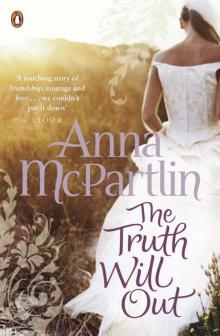 The Truth Will Out
The Truth Will Out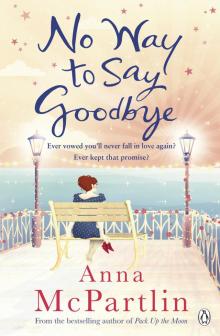 No Way to Say Goodbye
No Way to Say Goodbye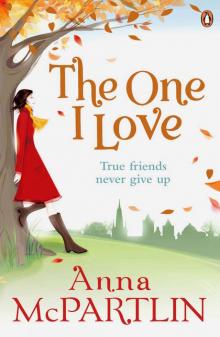 The One I Love
The One I Love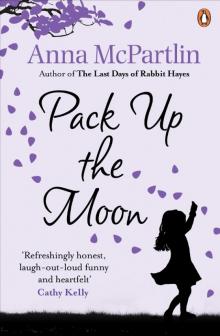 Pack Up the Moon
Pack Up the Moon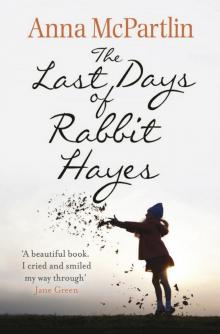 The Last Days of Rabbit Hayes
The Last Days of Rabbit Hayes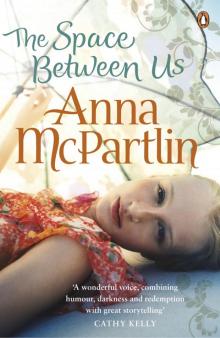 The Space Between Us
The Space Between Us